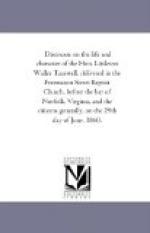His time had come. He had disappeared from our sight to take his place in history. He had attained an age almost double that which his father had reached when that honored statesman fell in a distant city in the service of his country; and he had been blessed with a larger share of health than usually attends extreme old age. His faculties, which had kindled the admiration of our fathers, shone bright to the last. His children had reached maturity, and watched and cheered with tender care his failing hours; and with each revolving morn his numerous grandchildren came with their infantile ways to win the blessing of their ancestor. Had he lived, he could not have performed any public service. The voice whose tones had so often echoed in the forum was gone, and his feeble limbs could no longer bear his weight. His duty was done. His orations for the crown had all been delivered; and that crown had been won and worn for half a century with the modesty which became a wise and virtuous statesman of a republic; and when it was about to be taken from his brow to be garnered for the coming ages, its flowers were fresh, and, like those which the muse of Milton strewed about the walks of Eden, were without a thorn. He had run a long and glorious course. His duty was all done. He had taken his place in the history of his country.
In the contemplation of such a character, when the keen pang of parting is past, joy should take the place of mourning. Let us rejoice at the prospect which greeted his closing eyes. In his last days he was cheered by the greatness of his country. When he first saw the light, his beloved Virginia was indeed bounded by the Ohio, and had a nominal line on the Mississippi, the extreme verge of the British claim; but she was the humble vassal of imperial power. He saw that Virginia, when, retiring from the Danube of the West, she gave independence and position to that lovely region, which, under the name of Kentucky, became her equal in the federal union. He saw that Virginia, beneath the banner of the gallant Clark, dipping her feet in the waters of the Northern lakes; and he saw her cede to the confederation that vast North-western domain with the single provision that states as free and as sovereign as herself should be carved from its territory; and he saw those states, one by one, take their station in the American Union. When he was born, the flag of Britain streamed from the old Capitol in his native city, and flapped above his head; and in the South the St. Mary’s was the extreme limit of British territory. He lived to see that flag the trophy of his country, and to see the stars and stripes wave above the waters of the Mexican gulf, and over those of the Atlantic and Pacific seas. He lived to see our numbers swell from three millions to more than thirty-one millions; and our commerce which at his birth was confined to a few ports of Britain float on every sea, and freighted with the wealth of every clime. He saw our extended country flourishing, beyond the example of so young a nation in ancient or in modern times, in the arts and sciences, in knowledge and in power and in true religion. And, with such a scene before him, he closed his eyes in peace.




